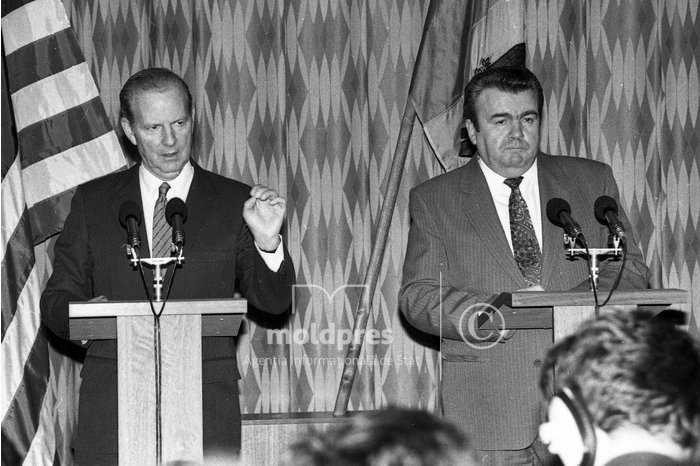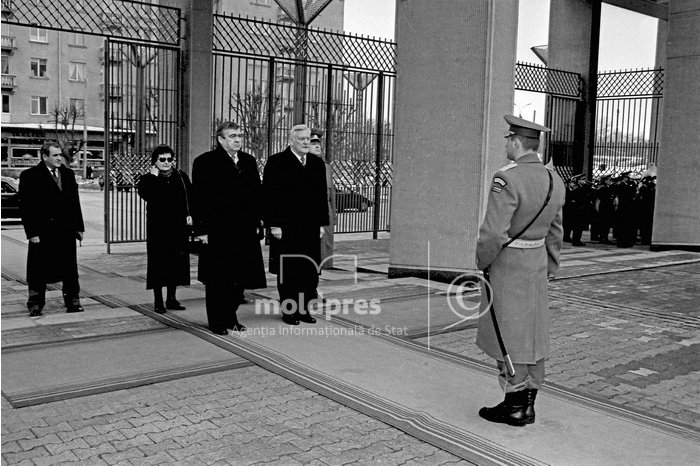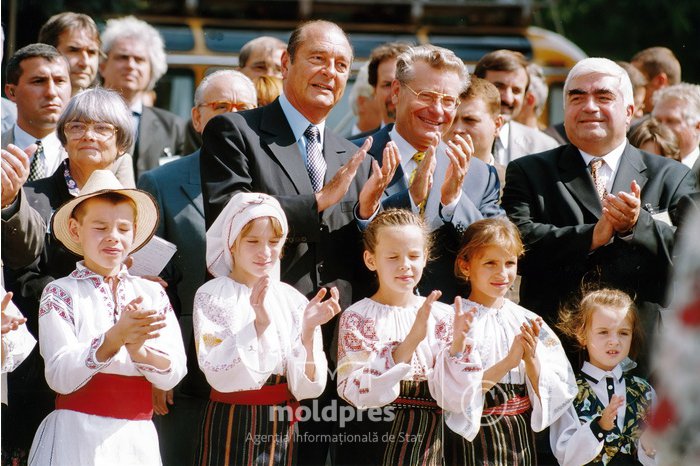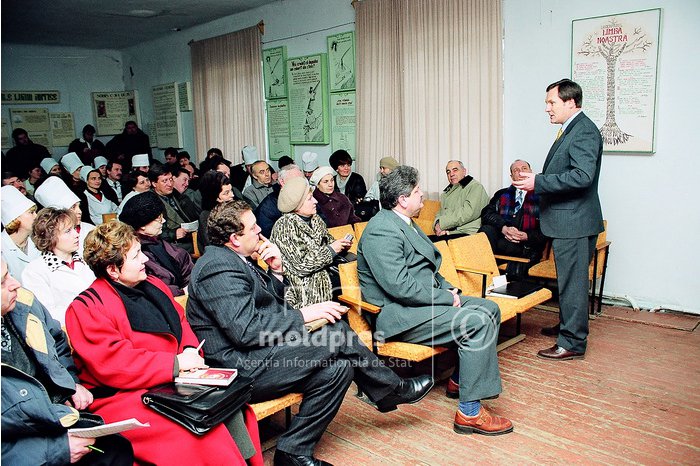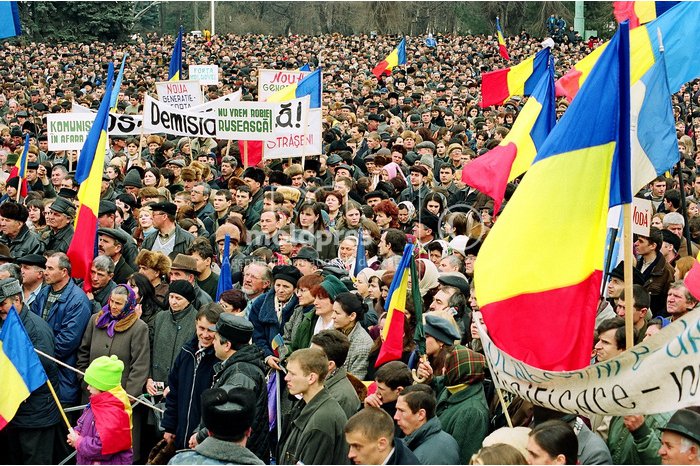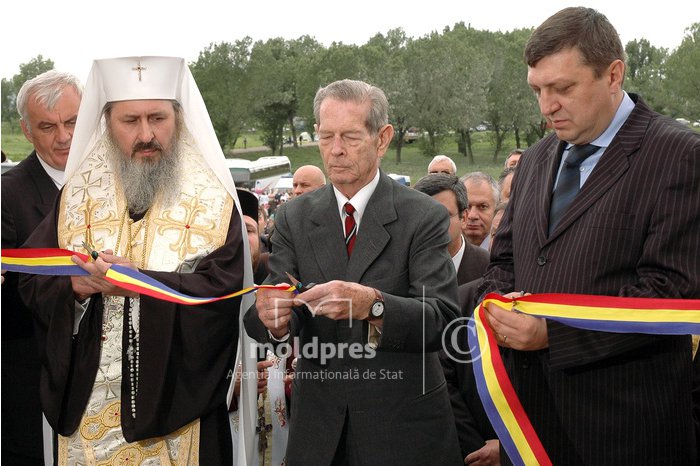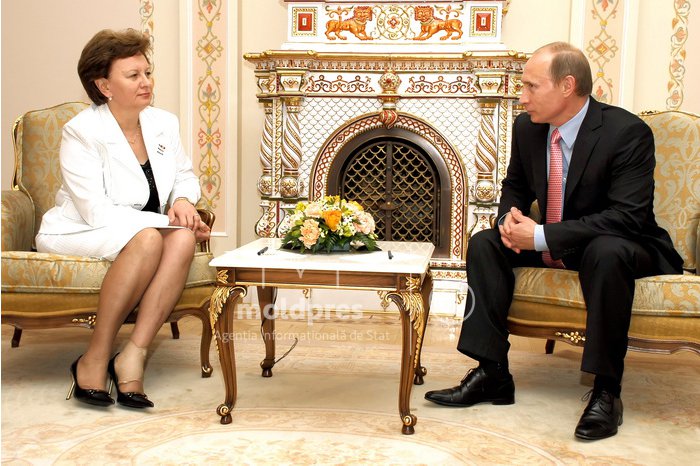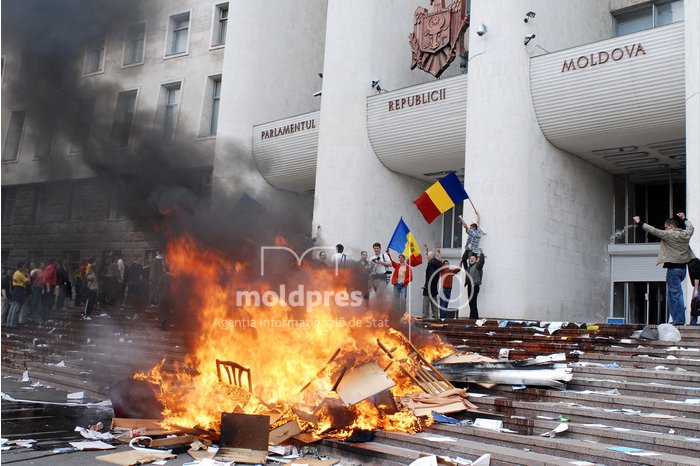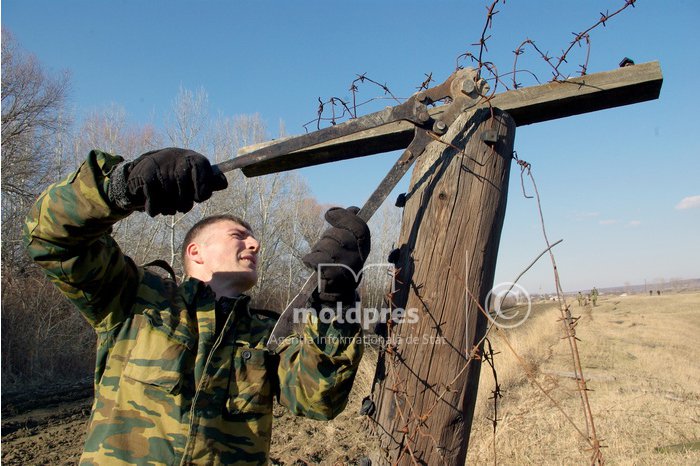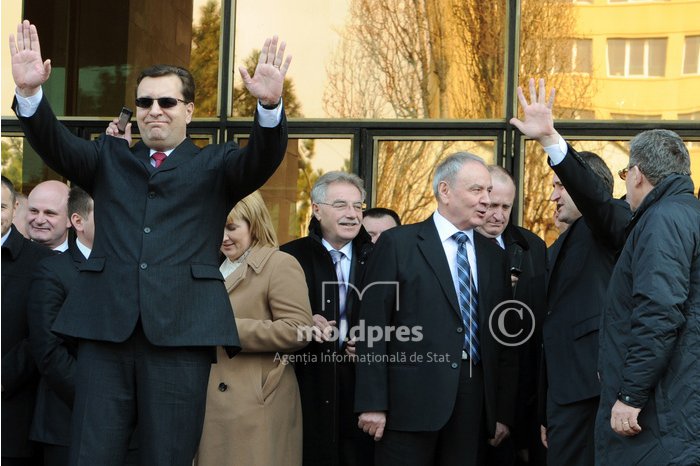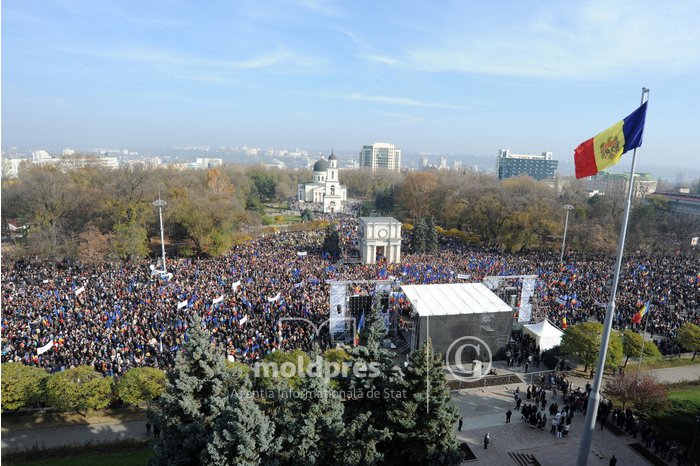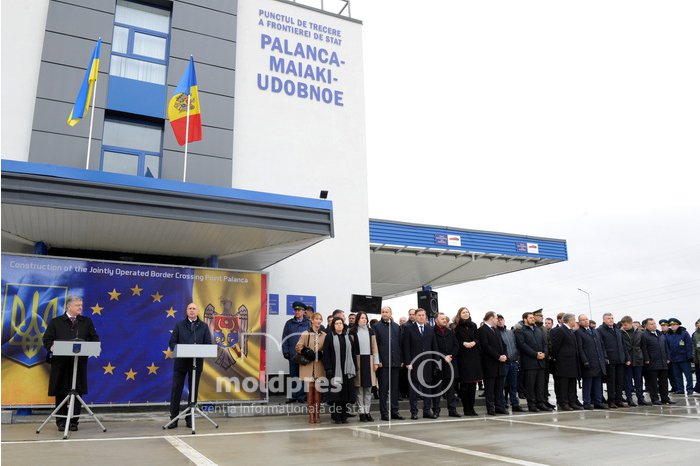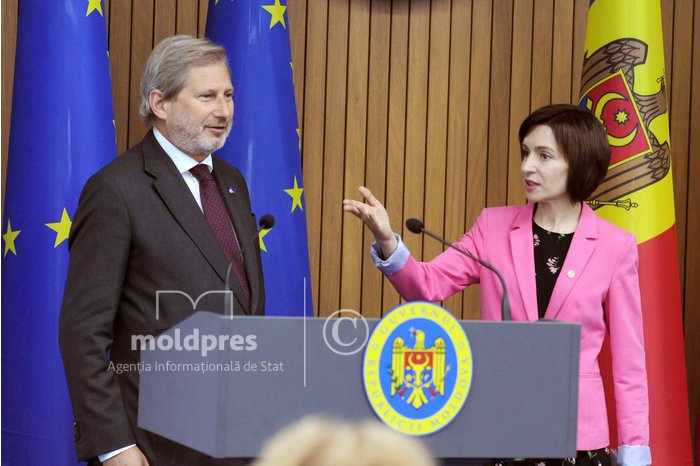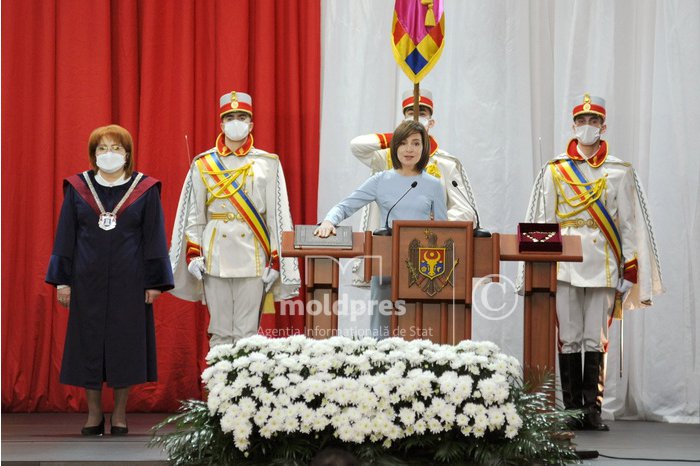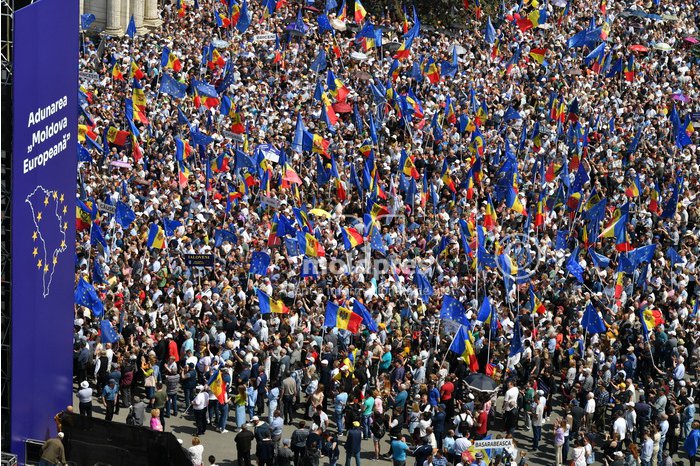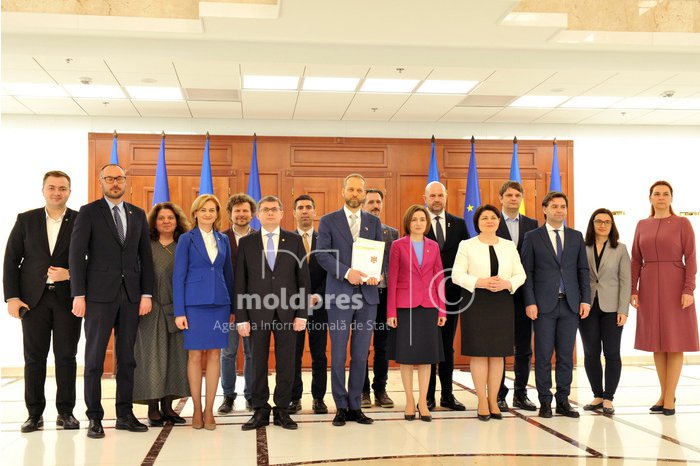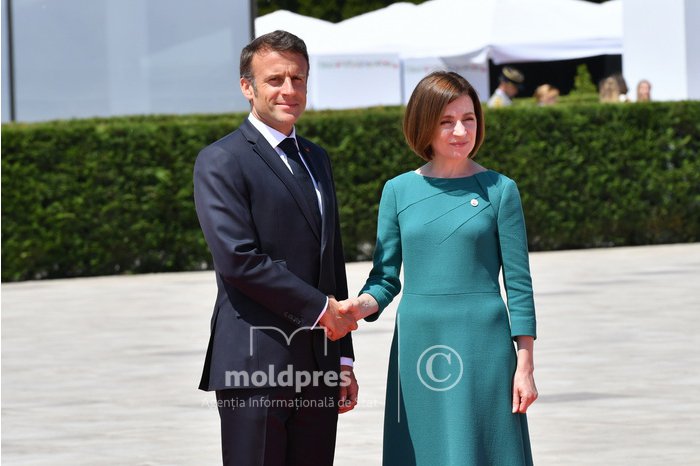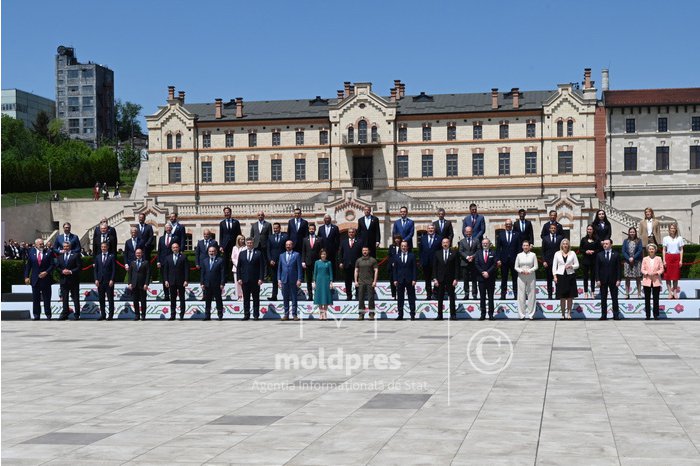PHOTO HISTORICAL PICTURES Way of 32 years from Independent Moldova to European Moldova
13:20 | 27.08.2023 Category: Political
Chisinau, 27 August /MOLDPRES/ - The revival of the national conscience of the Moldovan Soviet Socialist Republic (RSSM) took place in late 1980s, against the background of the crisis of the Communist totalitarian system. The idea of the harmonization of the inter-ethnic relations through the ‘’Perestroika’’ policy proved to be utopic. On 31 August 1989, the Supreme Soviet of RSSM adopted the Law on the status of the state language and its return to the Latin script. On 27 April 1990, the Supreme Soviet of RSSM adopted the Law on the State Flag and on 23 June 1990 – the Declaration on the Sovereignty of RSSM.
On 23 May 1991, the official name of the state RSSM was changed into the Republic of Moldova. The parliament of RSSM changed its name into the parliament of the Republic of Moldova. The National Anthem of the Republic of Moldova, Wake Up, Romanian! (which remained in force till 7 June 1994) was adopted. Mircea Snegur became the first president of the Republic of Moldova and Alexandru Mosanu – parliament speaker of the Republic of Moldova.
On 4 July 1991, the Law on the citizenship of the Republic of Moldova was adopted, one of the most liberal laws from the South Eastern Europe. Under this law, all citizens who were living in the Republic of Moldova on the date of the declaring of the sovereignty were allowed to become its citizens, no matter their ethnic, linguistic affiliation, the period of residence or other criteria.
On 27 August 1991, the parliament of the Republic of Moldova, which convened at an extraordinary meeting, adopted the Declaration of Independence of the Republic of Moldova. The Republic of Moldova was declared ‘’sovereign, independent, democratic state, free to decide its present and future, without any interference from abroad, in accordance with the holy aspirations of the people in the historical and ethnic space of its national evolution.’’ The independence of the new state was recognized by Romania, Georgia, Russia, Ukraine, Kazakhstan, Switzerland, USA, Argentina, etc. The day of 27 August was declared Independence Day and national holiday of the Republic of Moldova.
On 3 September 1991, the president of the Republic of Moldova signed the Decree on the creation of the Armed Forces of the Republic of Moldova, with the major goal being the ensuring of the state’s sovereignty and territorial integrity. The decree on the subordination of the customs institutions, placed on the territory of the Republic of Moldova, was signed on the same day.
On 8 December 1991, the first elections of the head of state by universal voting took place. Mircea Snegur was elected first president of the Republic of Moldova.
On 29 July 1994, the parliament of the Republic of Moldova adopted the Constitution of the Republic of Moldova and on 22 July 1995, the Law on the National Anthem of the Republic of Moldova was voted – Our Language (with lyrics by military priest Alexei Mateevici) (1888-1917), music by composer Alexandru Cristea (1890-1942). On 7 June 1994, this new Anthem replaced the temporary anthem, Make Up, Romanian!, under the parliament’s decision.
In December 1991, a meeting of the leaders of those 11 states, former Soviet Union republics, including the Republic of Moldova, excepting the Baltic Countries, took place in Alma-Ata. They signed the declaration, the protocol and the Convention on the creation of the Commonwealth of Independent States (CIS). The Republic of Moldova signed the document, yet with the specification that it participates only in the economic cooperation. On 15 April 1994, the Republic of Moldova de jure joined the Commonwealth of Independent States.
In 1992, the Republic of Moldova became member of the Organization for Security and Cooperation in Europe (OSCE), full-fledged member of the United Nations Organization, getting the unanimous vote of the General Assembly. The new state is recognized internationally, and the status of subject of the international law was assigned to it. Diplomatic relations between the Republic of Moldova and the United States were established.
On 2 March 1992, the breakaway forces from the left bank of Dniester undertook violent actions against the district police station from Dubasari, the last police station from the breakaway area subordinated to Chisinau. In several days, the tensions extended also to other settlements from the left banks of Dniester, running the risk of degenerating from a local conflict into a regional one. Under the decisions by the Istanbul OSCE Summit from November 1999, Russia assumed the obligation to withdraw its troops and weapons from the territory of the Republic of Moldova till late 2002. To preserve the presence, (including the military one) on the territory of the Republic of Moldova, Moscow submitted the so-called Kozak Plan, which provided for the country’s federalization and the deployment of the Russian troops on the left bank of Dniester for a period of 22 years. This plan, however, was turned down by Chisinau in the autumn of the 2003 year. On 2 May 2017, the Constitutional Court of the Republic of Moldova issued an unanimous decision on the interpretation of the Article 11 on the permanent neutrality of the Republic of Moldova: ‘’the fact that Russia did not withdraw its occupation troops from the eastern region of the country, but on the contrary, consolidated its military presence in the Transnistrian region of the Republic of Moldova, represents an infringement of the constitutional provisions on the independence, sovereignty, territorial integrity and permanent neutrality of the Republic of Moldova, as well as of the international law.’’
Moldova‘s economy was delimited as distinct system following the proclamation of the state independence and the disintegration of the Soviet economic system, witnessing, in continuation, periods of temporary crisis and improvement. On 29 November 1993, the national currency was put into circulation. Starting from 2008, Moldova’s economy was hit by the world crisis, with the situation worsened by corruption acts in some public institutions and bank frauds. The European Union is one of the principal financers of the Republic of Moldova, with the volume of assistance increasing from 40 million euros in 2007 to about 100 million euros in 2016. According to the Doing Business 2017 study, the Republic of Moldova is placed on the 44th position out of 190 countries, recording progress in the payment of taxes, loans’ accessibility, starting businesses and regress in the protection of investors, in settling insolvency, increase in the cost for registration of business, etc.
On 24 December 1994, the parliament of the Republic of Moldova adopted the Law on the special legal status of Gagauzia (Gagauz-Yeri) – ‘’territorial unit with special legal status which, being a form of self-determination of the Gagauz people, is a component part of the Republic of Moldova.’’
On 13 July 1995, the Republic of Moldova became member state of the Council of Europe, being the first country of the Commonwealth of Independent states, received in this pan-European organization. In February 2005, the Republic of Moldova-European Union Individual Action Plan was signed. On 24 March 2005, the parliament of the Republic of Moldova unanimously adopted the Declaration on political partnership, in order to achieve the European integration goal. The strategic course of the Republic of Moldova’s European integration was gradually and irreversibly promoted through this document.
The domestic political life was marked by the succession of various political forces in power: Agrarian Democratic Party and Party of Socialists (1994-1996), the right-wing and the centre-left alliance (1998-2001), Party of Communists from Moldova (2001-2009). On 7 April 2009, mass protests took place in Chisinau, and the reason invoked was the rigging of the parliamentary elections. The buildings of the parliament and presidency were devastated. A new right-wing and centre-right-wing alliance came to power.
Sixty eight parties were registered in the Republic of Moldova on 28 April 2021.
On 21 December 2009, for the first time in the history of the relations between the Republic of Moldova and the European Union, a joint declaration was adopted in Brussels, which included specific goals of cooperation Republic of Moldova – European Union. During February-March 2010, the barbed wire was taken out at the state border of the Republic of Moldova with Romania.
Till 5 July 2000, the Republic of Moldova was a parliamentary-presidential republic and afterwards it became a parliamentary one. The second president of the Republic of Moldova was Petru Lucinschi (1996-2001) and the third one – Vladimir Voronin (2001-2009). After the interim periods of Mihai Ghimpu (11.09.2009–29.12.2010) and Marian Lupu (30.12.2010–16.03.2012), because of the parliament’s failure to elect the president of the Republic of Moldova,
on 16 March 2012, Nicolae Timofti became the fourth president of the Republic of Moldova, after getting 62 votes on behalf of the parliament. On 4 March 2016, the Republic of Moldova’s Constitutional Court ruled that the next president of the Republic of Moldova should be elected based on the universal, equal, direct and freely expressed vote. The next elections of the head of state were scheduled for 30 October 2016. Igor Dodon was president of the Republic of Moldova during 2016-2020. On 24 December 2020, Maia Sandu was sworn in the office of President of the Republic of Moldova.
At the Eastern Partnership’s Summit held in Vilnius on 30 November 2013, the Association Agreement between the Republic of Moldova and the European Union was initialed. In April 2014, the European Union took the final decision on the liberalization of the visa regime for the citizens of the Republic of Moldova, giving them possibility to travel to European Union states without visas. In the summer of 2014, the Council of the European Union adopted the European Union-Republic of Moldova Association Agenda and Moldova’s parliament ratified the Association Agreement with the European Union with the votes of 59 MPs. On 13 November 2014, the Association Agreement with the Republic of Moldova was ratified at the meeting of the European Parliament. On 1 July 2016, the Association Agreement between the Republic of Moldova, on the one hand, and the European Union and the European Atomic Energy Community and their member states, on the other hand, signed in Brussels on 27 June 2014, entered into force. This event signifies the finishing of the procedure of ratification of the Agreement by the signatory sides and the full enforcement of all its provisions.
On 23 June 2022, the Republic of Moldova and Ukraine received the status of country candidate for accession to the European Union. The status of candidate for accession to the European Union can give a country concrete benefits, for instance, due to the fact that it becomes more attractive for investments, the commercial flows are easier and the stability is greater. Following the recommendations earlier presented by the European Commission on giving Moldova the status of country candidate for integration into EU, the Moldovan authorities showed determined in the process of carrying out the reforms in such key sectors as: justice, combating corruption and public administration.
The application on the Republic of Moldova’s accession to the European Union was signed by the president of the Republic of Moldova on 3 March 2022.
On 1 June 2023, the Republic of Moldova hosted the most important political events in its history – the Summit of the European Political Community (EPC). About 50 European heads of state, prime ministers and high-ranking officials brought together in Moldova, in order to discuss about peace, security, energy and connectivity. The event is regarded as historical, as a diplomatic meeting of such a proportion was organized in Moldova for the first time ever.
The European Political Community is a pan-European governmental organization set up in 2022, at an initiative by President of France Emmanuel Macron, following Ukraine’s invasion by Russia. It includes European leaders, with the goal to discuss and identify solutions to the most urgent problems of Europe, such as security, stability and energy resilience. The first Summit of the European Political Community took place in Prague, the Czech Republic, and the next meeting is to be held in Spain in autumn, this year.

